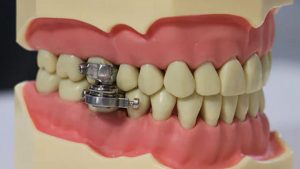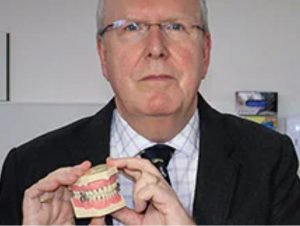An unconventional weight loss device that bolts the jaw of its user closed has been designed to combat the globe’s “obesity epidemic”.
 DentalSlim Diet Control is an intra-oral device fitted by a dental professional to the upper and lower back teeth. Picture: University of OtagoSource:news.com.au[/caption]
DentalSlim Diet Control is an intra-oral device fitted by a dental professional to the upper and lower back teeth. Picture: University of OtagoSource:news.com.au[/caption]
The device, which is fitted by a dental professional to the upper and lower back teeth, works using magnets and custom-manufactured locking bolts.
The user is therefore restricted to a liquid-only diet but apparently is still able to manage free speech and importantly, breathing.
University of Otago Health Sciences Pro-Vice-Chancellor Professor Paul Brunton said in the release that the device would be “effective, safe and affordable” for people battling obesity.
In an emergency, the device can be removed and refitted by its user with a special tool.
“The main barrier for people for successful weight loss is compliance and this helps them establish new habits, allowing them to comply with a low-calorie diet for a period of time. It really kickstarts the process,” Professor Brunton said.
He claimed the device, despite its locking bolts, to be “non-invasive” and a better option than surgery.
“It is a non-invasive, reversible, economical and attractive alternative to surgical procedures,” he said.
“The fact is, there are no adverse consequences with this device.”
Bariatric surgery, while a good option for the morbidly obese, was not a sufficient solution for the how severe the obesity epidemic was, according to Professor Brunton.
It costs about $24,000 and patients “live with the consequences of that for life, which can be quite unpleasant,” he said.
[caption id="attachment_11134" align="aligncenter" width="997"] Professor Paul Brunton said the device was non-invasive and would be effective, safe and affordable for people with obesity. Picture: University of OtagoSource:news.com.au[/caption]
Professor Paul Brunton said the device was non-invasive and would be effective, safe and affordable for people with obesity. Picture: University of OtagoSource:news.com.au[/caption]
“The beauty of it is that once patients are fitted with the device, after two or three weeks they can have the magnets disengaged. They could then have a period with a less restricted diet and then go back into treatment,” he said.
“This would allow for a phased approach to weight loss supported by advice from a dietitian allowing long term weight loss goals to be realised.”
Patients are given a tool to open the device in an emergency, but none of the study participants needed to use it, according to the research paper, published in the British Dental Journal.
Since the trial, the device has been made smaller to improve its functional comfort and aesthetics.
Professor Brunton said overall participants “felt better about themselves”, had more confidence and were committed to continuing to lose weight.
He added how the device could help people desperate to lose weight by “really pump priming the process”.
“It’s hard yards. Patients who really want to do this have to be committed,” he said.
SOURCE: news.com.au




